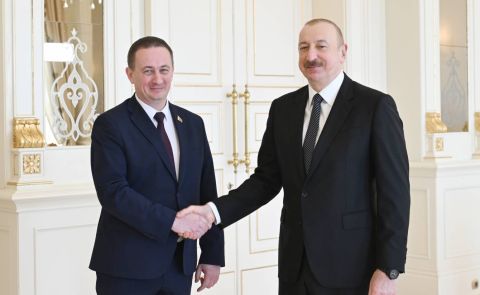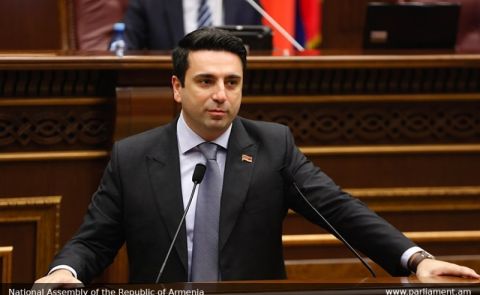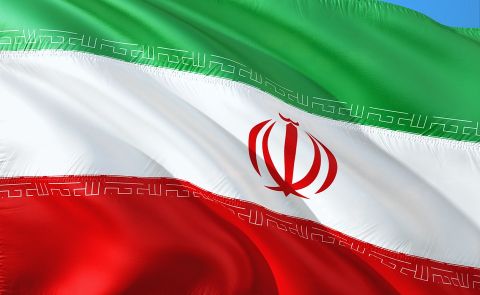
Nagorno-Karabakh: Cautious Hope

The World Economic Forum in Davos (Switzerland) surprised with a spontaneous informal meeting between the Armenian Prime Minister Nikol Pashinyan and Azerbaijani President Ilham Aliyev. The meeting took place on 22 January and lasted for one and a half hours. According to Pashinyan, he and Aliyev talked about the history of the negotiation process and the current obstacles to peace. The meeting between Pashinyan and Aliyev in Davos was preceded by four-hour talks on 16 January between the foreign ministers of the two countries.
Shortly before the meeting with Pashinjan, Ilham Aliyev, in an interview with the state-run Russian news agency RIA Novosti, stated that neither Azerbaijan's membership of the Collective Security Treaty Organization nor the observer status in this Russian-dominated military bloc was under discussion. In the Azerbaijani media, this message was interpreted as the end of the so-called "Lavrov Plan" for the settlement of the Nagorno-Karabakh conflict. This alleged plan, whose existence the Russian Foreign Minister Lavrov himself denies, is intended to return several occupied regions around Nagorno-Karabakh to Azerbaijan, without defining the international legal status of Nagorno-Karabakh. But according to the plan, Baku should be expected to pay a political price and join the Russian-dominated military bloc and the Eurasian Economic Union. Belarusian President Lukashenko recently told Russian journalists that he and Vladimir Putin were still in favor of a similar plan of conflict resolution during the reign of former Armenian president Sersch Sargsyan. The return of five regions around Nagorno-Karabakh was the condition of Azerbaijan to join the CSTO and the Eurasian Union, revealed Lukashenko. However, Serzh Sargsyan had disagreed with this plan.
Since the "Velvet Revolution" in Armenia, there has been growing hope in the international community that the peace talks between the hostile South Caucasus states would receive a new impetus. Carnegie Europe research associate Thomas De Waal, an expert in the Nagorno-Karabakh conflict, described the meeting in Davos and the OSCE's recent statement as "the first positive news in many years in the Nagorno-Karabakh developments". "The transfer of power in Armenia and an unprecedented reduction in incidents on the ceasefire line create new conditions for the continuation of the peace process... The discussion on how to solve the conflict and the question about how Armenians and Azerbaijanis could live together peacefully must go beyond the framework of a narrow group of people. It is to be hoped that the public in Azerbaijan and Armenia will begin honest discussions on ways to end hostility and achieve a mutually acceptable peace", De Waal said.
The news that Armenia and Azerbaijan have taken a small step towards peace has been welcomed by observers as a rare sign of hope in the conflict between the two countries, writes journalist Joshua Kucera in a post for Eurasianet. However, many voices in the region reacted negatively to the news and vividly demonstrated the hardened attitudes towards the possible compromises that would be needed for a true peace treaty.
After meeting in Paris on 16 January, the Foreign Ministers of the two countries declared that they had "agreed on the need to take concrete measures to prepare the people for peace". Many welcomed this passage of the Declaration, which had been the most positive formulation on both sides for years of a long period of stagnation in the peace talks. Secretary-General of the United Nations, Antonio Guterres, welcomed the recognition by the ministers, writes Kuchera.
But the prospect of an undefined "peace" also caused discontent on both sides, as the details of the peace talks were not disclosed. On the one hand, the Armenians fear that the agreement with Azerbaijan could end with territorial concessions in favor of the Azerbaijani side. On the other hand, many Azerbaijanis see the possible agreement as a naïve capitulation to Armenia, leaving the occupation of the Azerbaijani territories unchanged. Neither in Armenia nor in Azerbaijan did the governments explain the results of the meeting to their skeptical citizens, according to Eurasianet.org. One of the leading politicians of the former ruling party, the Republican Party of Armenia, Eduard Sharmasanov, criticized that the statement on the foreign ministers' meeting did not even mention the people’s right to self-determination, which would weaken Armenia's bargaining position.
"The optimism of the Azerbaijani side is understandable, but the optimism of the Armenians is puzzling to me. I know in what direction this is moving. I see nothing good for us.", said Vardges Baghrjan, a member of the so-called Nagorno-Karabakh Parliament in an interview with the Armenian newspaper "Tert". A high-ranking member of Armenia's former ruling party, Armen Aschotjan, wrote a Facebook post calling the statement "incomprehensibly optimistic" and called on the government to explain the plan in detail.
The reactions on the Azerbaijani side were more calm and mixed. The newly appointed Chairman of the Azerbaijani Association of the Azerbaijan Community of the Nagorno-Karabakh region, Tural Ganyaliyev, welcomed the ministers' statement and said that the Azerbaijani community of Nagorno-Karabakh hopes for a peaceful solution and that the coexistence with the Armenian community could be ensured.
In an interview on 18 January, Azerbaijan's Chief of Staff, Nejmeddin Sadikhov, expressed his skepticism about the negotiations. "The President of Azerbaijan has given the new Prime Minister of Armenia the opportunity to consider and peacefully surrender the occupied territories of Azerbaijan," said Sadikhov.
Former foreign minister of Azerbaijan, Tofig Zulfugarov, says that the Armenian prime minister has strong opponents in his country and that he should consider their opinions in resolving strategic issues, such as the Nagorno-Karabakh conflict. According to Zulfugarov, Pashinyan would point out at every opportunity that his opponents would not allow him to make certain arrangements. Pashinyans’ task is to maintain the status quo and to gain time until the political situation in Armenia has normalized, believes Zulfugarov.
On both sides, the lack of explanation of what kind of peace people should be prepared for led to speculations that focused on each side's worst-case scenario, writes Kuchera. "For 25 years, we have been reading the same statements and explanations as the occupation continued. If everything is as the Foreign Ministry claims, and "the discussions are going in a useful and positive direction, why is nothing happening?", wrote Azerbaijani foreign policy expert, Elkhan Shahinoglu.
"The announcements that people should be prepared for peace are pretty promising at first sight. This means that now peace should take its first outlines so that people have something to be prepared for. If the shapes of a peace agreement are not apparent, people have nothing to prepare for, "said Azerbaijani foreign affairs analyst, Rauf Mirkadirov, in an interview with RFE / RL.
The next meeting of the Azerbaijani and Armenian Foreign Ministers will be held in February, with the attendance of the co-chairmanship of the OSCE Minsk Group.
See Also


Simonyan Accuses Russia of Funding Destabilizing Efforts; Labels Kocharyan a “Russian Spy” and Defends Pashinyan’s Independent Foreign Policy

Iran Proposes Establishing Iran-Azerbaijan-Georgia Transit Corridor Within TRACECA Framework

Driver Opens Fire on Dagestan Police, Killing Three Officers and Wounding Civilians

Former Russian Social Fund Official in Ingushetia Detained in Antalya on Embezzlement Charges

